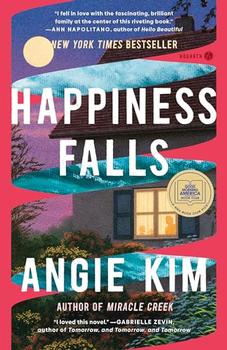Summary | Excerpt | Reading Guide | Reviews | Beyond the Book | Readalikes | Genres & Themes | Author Bio

A Novel
by Angie Kim
While all that was going on, I was in the midst of what I was thinking of as one of the great tragic moments of my life. It's funny how relative these types of judgments are, how much they can change depending on context: that day has obviously since become The Day Dad Disappeared, but if you'd asked me that morning, I'd have sworn it was The Day of the Big Breakup. Not that it was as dramatic as all that. The breakup itself had, unbeknownst to me, happened earlier through Vic's semi-ghosting, which I'd noticed but misinterpreted as him needing alone time. This was my first Serious Relationship (as in, one lasting more than six months), and I thought I was being considerate in stepping back rather than nagging for attention and insisting he open up to me and bare his soul or whatever, but what I was apparently actually doing was failing a test of some sort—how much I cared, how much our relationship meant to me, etc. That morning's call was merely a courtesy notification of the results.
I listened quietly to Vic's (trying a little too hard to be) cool, matter-of-fact conclusion that he thought it best we "remain separated" because I obviously didn't care all that much, and it occurred to me that this call was yet another test, which I could pass by acting upset and saying "of course I care" and "it's just the quarantine and the agony of being apart, the angst of isolation," blah blah. But I don't do drama. Also, I was pretty pissed that this guy who usually extolled my "refreshingly low-maintenance lack of game playing" was playing one himself and expecting me to participate and excel. It was juvenile, insulting, and, frankly, more than a little deceitful. Which is exactly what I said as soon as he stopped talking, right before I hung up. (I believe in saying what you're thinking, as much as is practicable.) I threw my phone across the room—hanging up on an iPhone isn't nearly as satisfying as slamming down an old-fashioned phone like our kitchen landline, and besides, I had an industrial-strength titanium phone protector—but damned if it didn't land on my plush comforter.
I was contemplating picking it up to try again when I saw something out the window that stopped me: a boy in a bright yellow shirt, rounding our street corner, running fast. The thing my brain couldn't reconcile was that the shirt was definitely Eugene's—I distinctly remembered him wearing it that morning—but that running gait was definitely not. Eugene's mosaic Angelman syndrome means that he has two distinct sets of genes in his body: some cells with an imprinting defect and some that function normally. The mosaicism makes him "less affected," without some of the most severe symptoms that can plague AS kids, like seizures and difficulties walking and eating. Eugene can do some things he's been practicing all his life like using utensils, walking, and even running, but he has issues maintaining consistent coordination and speed. It's like a tongue twister; you might manage saying it once or twice carefully and slowly, but the longer and/or quicker the utterance, the greater the chances of tripping up. Eugene needed years of therapy just to walk long distances—that's why the daily hikes to and from the park with Dad, for practice—and I'd always thought he didn't like running at all. So how was it possible that this boy who appeared to be my little brother was running the length of our long street?
It's funny with siblings, how you think of them as just there, but then something great or awful happens that unearths and makes visible what Koreans call jeong. It's hard to explain in English; it's not any particular emotion—not affection or even love—but a complex bond defined by its depth and history: that sense of belonging to the same whole, your fates intertwined, impossible to sever no matter how much you may want to. I rushed downstairs, threw open the front door, and ran outside, barefoot. "Oh my God, Eugene, look at you go," I yelled out and clapped and—God, this is so not me, but I couldn't help it—even whooped and jumped a little.
Excerpted from Happiness Falls (Good Morning America Book Club) by Angie Kim. Copyright © 2023 by Angie Kim. All rights reserved. No part of this excerpt may be reproduced or reprinted without permission in writing from the publisher.
Your guide toexceptional books
BookBrowse seeks out and recommends the best in contemporary fiction and nonfiction—books that not only engage and entertain but also deepen our understanding of ourselves and the world around us.